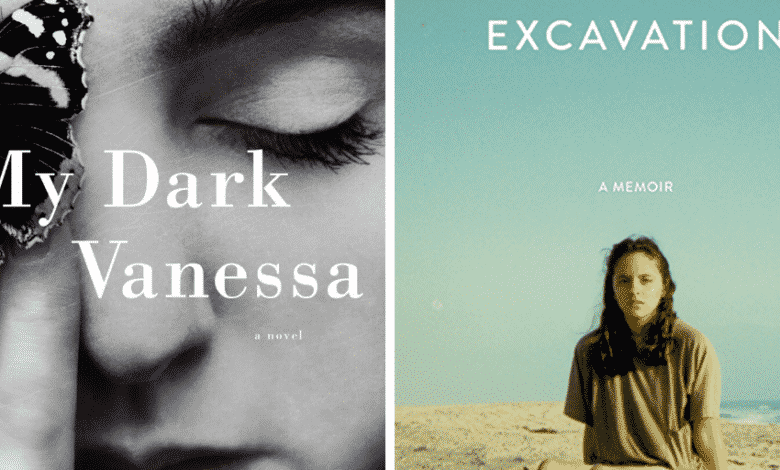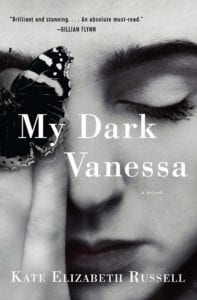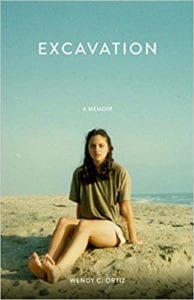
Content Warning: Due to the nature of the books and stories involved, this article will include non-graphic references to sexual abuse of children, specifically teenagers.

Up until last week, My Dark Vanessa was one of the most highly-anticipated books of 2020. A novel by Kate Elizabeth Russell. It tells the story of a teenage girl who enters into a sexual relationship with her adult English teacher and how she is forced to deal with that past when she herself becomes an adult and another former student accuses him of sexual abuse.
Heralded by both the New York Times and The Guardian, the book isn’t even due out until March 10 but has been the subject of a mammoth press push and a reported 7-figure advance.
However, that excitement hit something of a speed bump on January 19 when author Wendy C. Ortiz took to Twitter to criticize the book, saying it was similar to her 2014 memoir entitled Excavation:
Though this was the result of a brewing controversy among Ortiz’s fans, this brought the allegations to a new audience and prompted Ortiz not only to explain in greater detail but to follow up with an essay on Medium on January 29th.
In that essay, she said My Dark Vanessa was “eerily similar” to her book. The main difference was that Ortiz’s book was a memoir of her experiences when she was abused by a 28-year-old man when she was just 13 while Russell’s was listed as a work of fiction.
Russell, for her part, reached out to Ortiz after the initial Tweets. There, she admitted to having read Excavations as part of her research. However, this did not smooth things over with Ortiz, who posted on Twitter the next day.
Russell has gone on to say that, though her book is a work of fiction, she has been working on it for nearly 20 years. In December 2018 she stated that it was moved from being a memoir to being fiction when she chose to make the teacher in her story a composite of the adult men that abused her.
However, the allegations of plagiarism are really only a small part of the story. Ortiz’s grievances deal less with the possibility that her story was coopted, but with the publishing industry itself.
The Battle Over Diversity

In Ortiz’s essay, she outlines the long path she walked to get her book published.
Despite initial interest from publishers and agents, she received repeated feedback from editors that it would not achieve the kind of “wide audience” success they were hoping for with a debut author. Others simply opined that memoirs were overdone, especially for new authors and writing about sexual abuse topics.
She ended up finding a home on a small press and, though the book did well on its initial run, she found no large publishers willing to take it up after it had proven itself.
This, understandably, made it sting all the more when she learned that Russell was becoming a press and media star with her very similar tale. While her book struggled to find a large audience despite a great deal of acclaim, Russell had praise and a significant advance before her book was even out.
For Ortiz, much of the difference could be attributed to race. Ortiz, a Latinx author, felt that at least some of the success of Russell’s work could be attributed to her being white and, thus, more acceptable to the publishing industry. As she said in her essay while discussing her editors’ notes, “‘Wide’ is likely code for white.”
This accusation is nothing new to the publishing industry, which has long been labeled as being “hideously middle-class and white” or simply not having diversity despite multiple attempts and efforts to become more inclusive.
To that end, it’s very clear that Ortiz is far from the only person to raise these exact problems.
In fact, the recent controversy over the book American Dirt put those issues into the mainstream media. There, a white author told the fictional story of a Mexican woman and her son fleeing to the U.S. to escape a drug cartel.
The book became a flashpoint to discuss diversity, cultural appropriation and related issues in the publishing industry. This included allegations that the book oversimplified and misunderstood Mexican culture and was exploitative toward the groups it featured.
The backlash has become so strong that Oprah, who had previously planned to feature the book as part of her book club, now says it will require a “deeper, more substantive discussion” than originally planned. Likewise, a book tour for the novel was also canceled.
Ortiz’s story and her accusations not only overlap with the controversy over American Dirt, but also dovetails into it, connecting pieces of a puzzle that highlight a publishing industry that faces terse challenges with race and appropriation issues.
Unfortunately, even though these issues are nothing new, the publishing industry still seems ill-equipped to handle them.
The Future for My Dark Vanessa
Fourth Estate, the publisher behind My Dark Vanessa, has released a statement supporting Russell. It seems likely that her book, much like American Dirt, will go on to be a bestseller.
As for any plagiarism of allegations, we can’t possibly know similar the two works are in total until My Dark Vanessa is released in March. To that end, readers will be the ultimate judge.
Note: I’ve been unable to find anyone who has read a review copy of My Dark Vanessa commenting directly on this. I will update this story if one does or if there is a comment I missed.
The unfortunate truth is that stories like Ortiz’s and Russell’s are far too common. Many girls experience sexual abuse and, as Russell pointed out in her statement, “Victims are not a monolith and there is no universal experience of sexual violence.” Both of their stories and experiences are valid and worthy of attention.
Ultimately, the bigger issue is the one with the publishing industry itself, in particular with diversity. Unfortunately, that’s an issue I am in no way qualified to offer commentary on. I can only listen to the experiences of Ortiz and other Latinx authors.
Though it is unlikely My Dark Vanessa was a plagiarism, it still raises difficult questions about the publishing industry. This is likely why Ortiz, when discussing the book, never uses the word “plagiarism” and, instead, focuses on the broader publishing industry issues.
Ultimately, those issues impact the industry as a whole and are much larger than any similarities between these two books.
Bottom Line
A lot of times, when stories like this break out, I get a small flood of requests to discuss or talk about it. This one is no different.
However, as I dug into it I realized that the core issues at stake were well outside of my area of expertise. I am a plagiarism expert and a white male one at that. I can not speak to the Latinx experience in publishing nor can I speak to how to improve diversity in the field. I can only listen to others.
As for the similarities, it appears that both Russell and Ortiz had somewhat similar backgrounds. To that end, it’s an unfortunately common story for many women.
The question is: Why was Ortiz’s retelling so heavily rejected while Russell’s so quickly accepted and promoted? Race, ultimately, is just one factor in this story as there are undoubtedly countless other differences including the timing of the books, fiction vs. non-fiction and so forth.
But when you put Ortiz’s story into context, it becomes a piece in a much larger puzzle. It’s a puzzle that highlights an industry struggling with diversity, appropriation and other issues related to race and culture.
The hope I have is that the publishing industry takes these issues to heart and, between this controversy and the ongoing one over American Dirt that the industry will start to seek out real change.
However, history has not been kind to publishing here as these are far from the first, and likely won’t be the last, such controversies it faces.
Want to Reuse or Republish this Content?
If you want to feature this article in your site, classroom or elsewhere, just let us know! We usually grant permission within 24 hours.